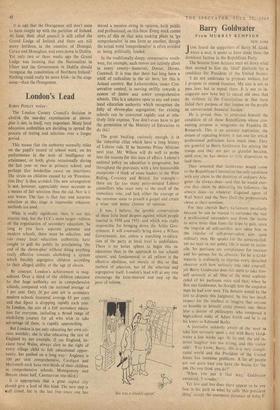London's Lead
ROBIN PEDLEY writes : The London County Council's decision to abolish the one-day examination at eleven- plus is not, in itself, very important. Many local education authorities are deciding to spread the process of testing and selection over a longer period.
This means that the authority normally relies on the pupil's record of school work, on his performance in the tests of intelligence or attainment, or both, given occasionally during the last year or two at primary school, and perhaps (for borderline cases) on interviews. The strain on children caused by an 'Examina- tion Day' is thus avoided. The new arrangement is not, however, appreciably more accurate as a means of fair selection than the old. Nor is it any worse. The fact is that fair and accurate selection at this stage is impossible whatever methods are used.
What is really significant, then, is not this interim step, but the LCC's main target—reform of the organisation of secondary education. So long as you have separate grammar and modern schools, there must be selection; and too many local education authorities have sought to gull the public by proclaiming 'the end of the eleven-plus' without doing anything really effective towards abolishing a system which forcibly segregates children according to their alleged ability at the age of eleven.
By contrast, London's achievement is mag- nificent. Over a third of the children educated by that huge authority are in comprehensive schools, compared with the national average of 5 per cent. Only 20 per cent are in secondary modern schools (national average 65 per cent) and that figure is dropping rapidly each year. In London, the aim of a full secondary educa- tion for everyone, including, a broad range of sixth-form courses for all who wish to take advantage of them, is rapidly approaching.
But London is not only educating her own citi- zens worthily; she is also educating the rest of England by her example. (I say England, be- cause rural Wales, always alert to the right of every village child to full educational oppor- tunity, has pushed on a long way: Anglesey is 100 per cent comprehensive, Cardigan and Mcrioneth each have two-thirds of their children in comprehensive schools, Montgomery and Brecon about half, Caernarvon one-third.) It is appropriate that a great capital city should give a lead of this kind. The new step is well timed, for in the last two years one has sensed a massive swing in opinion, both public and professional, on this issue. Every week comes news of this or that area making plans to 'go comprehensive' in one form or another, though the actual word 'comprehensive' is often avoided as being politically loaded.
In the traditionally sleepy, conservative south- west, for example, such moves are actively afoot in every county—Somerset, Dorset, Devon, Cornwall. It is true that there has long been a whiff of radicalism in the air here, for this is Acland country. But Leicestershire, 'under Con- servative control, is moving swiftly towards a system of junior and senior comprehensive schools. This is a solution open to any and every local education authority which recognises the folly of eleven-plus segregation; for existing schools can be converted rapidly and at rela- tively little expense. You don't even have to get the permission of the Ministry of Education to do this!
The great backlog, curiously enough, is in the industrial cities which have a long history of Labour rule. If he becomes Prime Minister next year, Mr. Wilson will do well to probe into the reasons for this state of affairs. Labour's national policy on education is progressive, but throughout the provinces, with a few honourable exceptions—I think of some leaders in the West , Riding; -Coventry and Bristol, for example— there are far too many petty-minded Labour councillors who react only to the smell of the immediate vote, and lack either the courage or the common sense to preach a gospel and create a wiser and better climate of opinion.
It was, I believe, the ignoble conservatism of these little local despots against which people reacted in 1950 and 1951; and which was really responsible for bringing downthe Attlee Gov- ernment. It will eventually bring down a Wilson Government, too, unless a searching re-educa- tion of the party at local level is undertaken. There is no better sphere to begin this re- education than in the approach to our schools system; and fundamental to all reform is the effective abolition, not merely of this or that method of selection, but of the selection and segregation itself. London's lead will at any rate encourage the faint-hearted and step up the pace of reform.
'Ile was a double agent.'


































 Previous page
Previous page